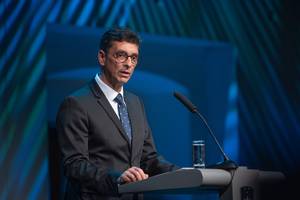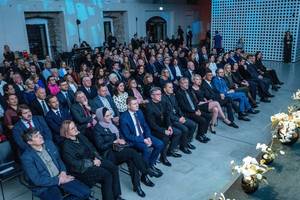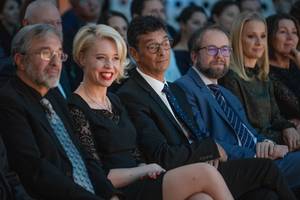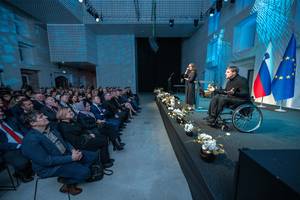It has been 75 years since the Universal Declaration of Human Rights was adopted on 10 December 1948, and 30 years since the establishment of the Human Rights Ombudsman of the Republic of Slovenia. These are important anniversaries, which, like other milestones, including personal ones, should encourage us to direct our gaze and thoughts both back, to our accomplishments, decisions and relationships, and also ahead, to our goals, wishes and inspirations. And maybe also to the way we would like to act so that we will grow as individuals and as a society or community.
We are witnessing rapid progress. Many important ideas have been put into practice. Some are used responsibly to serve humanity, while others warn us of their incredibly destructive power. There has never been such urgent need for solutions to so many ethical and moral dilemmas as has arisen with the recent expansion of knowledge, innovations and artificial intelligence. Our physical and intellectual limitations do not allow us to keep up with everything such development offers; many cannot even keep up with things such development demands from them. This is one of the reasons experts are noting increasing anxiety, fear, feelings of powerlessness and distress among people. It seems that we are losing a sense of security, and the rush of our daily lives and everything that comes with it are causing a rise in individualism, ignorance, indifference, selfishness and egotism. I have a feeling that we are drowning in an anonymous crowd that each day is less and less sympathetic to the suffering of others, that the foundations we have been building through years, decades, if not centuries, are shaking.
I remember well that in 2019, when I started my term of office, the word of the year chosen by the Research Centre of the Slovenian Academy of Sciences and Arts was climate. In 2020, which was marked by the COVID-19 pandemic, the word that won the most votes was quarantine. In 2021, it was the acronym PCT, which stands for the recovered/vaccinated/tested rule, and last year firefighter, which reminded us of the devastating fire that raged in the Karst at that time. All these words fall under one umbrella term: crisis. On the one hand, humanity is witnessing astounding progress, but on the other it is witnessing crises – social, health, financial, economic, environmental, climate and migratory crises, and also a crisis of values, are becoming a regular feature of our daily lives.
Crises bring many tragic stories, but also wake us up, give us food for thought. The unimaginable scale of the floods that swept across Slovenia on the morning of 4 August definitely had such an effect. We will be dealing with their consequences and the devastation they left behind in terms of material, mental and spiritual damage for years to come. And we will probably also be determining responsibility for restoration measures that do not meet the expectations and wishes of people for a similar length of time. Nevertheless, I do hope that we will often return to all the good things they awakened in us. The moments when we bravely and sincerely put a neighbour, friend or stranger – a fellow human being – first. One can hardly remain indifferent to these distressing events and stories, even if not following them from the front row. And we did not remain indifferent. We mobilised, came together, collaborated, helped to the best of our abilities, as we do in such distressing moments. Goodness is in our DNA, in our social consciousness. Not everyone possesses it, unfortunately, but I believe that most of us do.
I am certain that I am not alone in the belief that an awakening caused by difficult events can spur us to wider action and participation. We are very good at doing so in a crisis, but not so much when the crisis is over and even less when we look at it from the distance of time. We have to remind ourselves, over and over again, how successful we were then, how capable of seeking solutions in cooperation. That we managed to forget political, historical, religious, social, material and all other divisions and put a person in distress, empathy and solidarity first. When I mention solidarity, I am not thinking only of its social, material or financial aspect, which we sometimes use to unburden our souls and clear our conscience. Solidarity is, above all, a relationship with a suffering person. It is empathy, kindness and fairness. It means being responsible for one another, protecting fellow human beings and caring for their well-being; it is communal care. This is the responsibility of the State as well as us as individuals, and it entails respect for dignity.
This was eloquently put by Ali Žerdin in August in a Saturday Supplement of Delo: "Solidarity rearranges memories. When disputing neighbours help each other, they unburden future generations. When nations between which there is not trust help each other, the fear lessens. When strangers help each other, the fear that they are bringing us infections, crime and immorality diminishes."
Solidarity and care for others are the very reason that humankind survived many critical moments in its history. If it had only pursued comfort, profit and power, it would probably not have persevered. I sincerely believe this, although I am sometimes accused of being overly optimistic, of moralising or preaching. I believe that the values that we are so fond of praising in theory can actually be put into practice again. Every day, each and every one of us has an opportunity to make a step towards a fellow human being. In various ways. Towards those whose lives are plagued by hardship and who might be unable to help themselves. Towards all who are suffering injustices, whose rights are being violated, who are deprived, trampled on, forgotten, or those who only need our attention, a kind word, a touch or closeness. When we succeed in stepping closer to our fellow human beings and remaining there with sincere purpose despite the burdens of our own daily lives, we will facilitate positive changes. Only we ourselves can, through our example, bring about the revolution we wish and expect from others.
Albert Einstein wisely said that we cannot solve our problems with the same thinking we used when we created them. This is also our responsibility. To break the established patterns we have been building for a long time. To move beyond the divisions and disagreements and reunite as a community. This is the only way to overcome the current crises and any crises we are bound to face in the future.
"Everything is in our hands" was the meaningful gesture chosen last year by the Association of Deaf and Hard of Hearing of Slovenia as the gesture of the year. Yes, everything is in our hands. Every step, every decision, every reaction. The opportunity to make a change for the better is here and now. However, in doing this, we must make sure that no one is left behind. "Because if you give, somebody has."[1]
[1] From the song “Prva vrsta” (First Line) by Hamo & Tribute 2 Love




